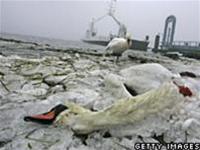On February 16, the European Union (EU) adopted new measures to prevent the spread of avian influenza across the continent following a two-day meeting in Brussels.
 |
| Avian influenza has been detected in several parts of Europe over the past week (Photo: TTO) |
Markos Kyprianou, the EU Commissioner for Health, stated that all necessary measures are being taken and the public should not “overreact.”
This EU action comes immediately after Slovenia confirmed that a swan found in the northern part of the country was carrying the deadly H5N1 virus.
Last week, H5N1 was also confirmed in wild swans in Austria, Bulgaria, Germany, Greece, and Italy. Hungary is currently testing dead swans to determine if they were infected with avian influenza.
During the meeting in Brussels, health officials approved preventive measures against avian influenza, including automatically establishing a protection zone of 3 km and a quarantine zone of 10 km around locations where outbreaks of avian influenza were detected in wild birds. If the avian influenza virus can be transmitted from wild birds to domestic poultry, these “buffer zones” may encompass the entire area, and the transportation of poultry will be restricted within these zones.
These measures are expected to be implemented in the coming days.
BBC reporters have noted that when avian influenza first emerged in Europe, the greatest concern was its potential to spread to humans. However, authorities are currently most worried about the virus spreading to Europe’s poultry population.
Several European countries, including Germany, Sweden, and Denmark, have mandated the confinement of poultry to prevent infection.
Other developments regarding avian influenza:
- France is testing avian influenza from a dead goose near Lyon and two dead ducks in northern Paris with unknown causes.
- Slovenia has confirmed H5N1 in a dead swan in the northern part of the country.
- Greece has detected two more geese infected with H5N1 in the northern region.
- Austrian authorities have identified a third goose infected with avian influenza near the city of Graz.
- Hungary is conducting tests on geese suspected of being infected with H5N1.
To date, H5N1 has killed at least 90 people worldwide, mostly in Southeast Asia. It can infect those who come into direct contact with infected poultry, but there is no evidence to suggest that it spreads from person to person.
TUONG VY (According to BBC)




















































